Croatia Heading to EuroBasket After Convincing 84-53 Victory over Switzerland
August 29, 2022 (HKS).
The Croatian national basketball team achieved its second victory as part of the pre-qualifications for the EuroBasket 2025. In Opatija, Damir Mulaomerović 's team defeated Switzerland with a score of 84-53 (50-26) .

Croatia has shown authority and seriousness from the beginning. A 6-0 start grew to 22-10 by the end of the first quarter. Bojan Bogdanović (7), Dario Šarić (5) and Karlo Matković (4) got off to a particularly inspired start .
In the second quarter, Croatia increased the speed, and the advantage constantly grew. After a great assist by Dominik Mavra for Matković, Croatia led 27-13. Bogdanović's three-pointer for 32-17 followed, and the first escape to a 20-point advantage via Matković (37-17), and by half-time the advantage grew to +24 (50-26).
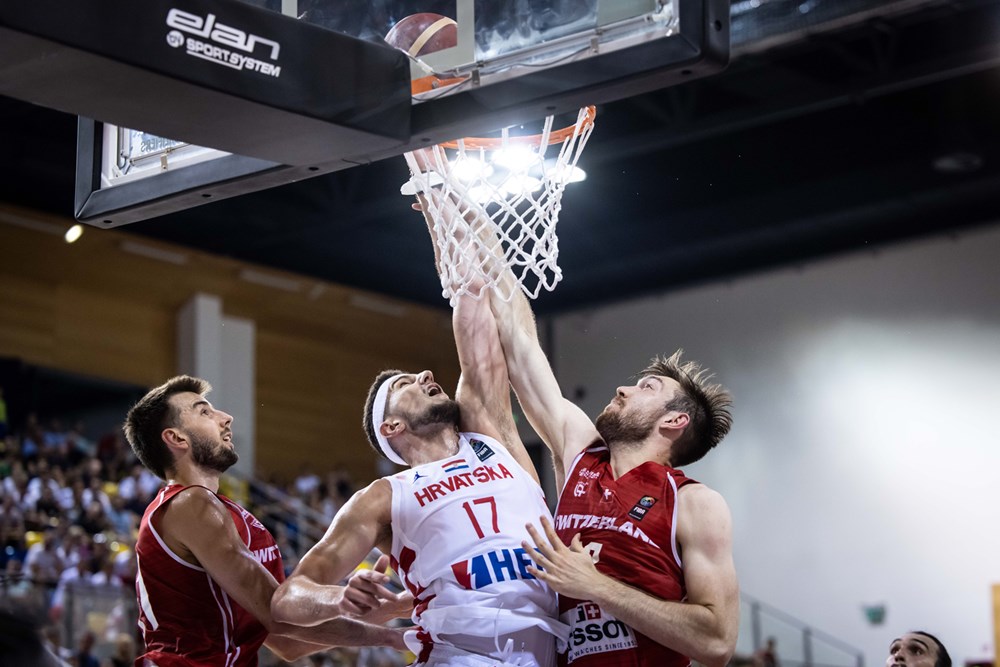
By then, Matković had already shown a great performance with 17 points and 8 rebounds. Bogdanović scored 10 points, and Dario Šarić scored 9 with 6 rebounds and two assists. Krunoslav Simon, although without a point, collected four assists and two steals by halftime.
The second half was an ideal opportunity for coach Mulaomerović to deploy his forces before going to EuroBasket, which starts on September 1, and give an opportunity to players who participated less in the previous part of the preparations and pre-qualifications for Eurobasket 2025. This did not affect the result. Matković was replaced under the basket by Ivica Zubac and with his dunk, Croatia went ahead for the first time by more than 30 points (59-28). The Croatian side entered the final quarter with +29 (70-41) and the game ended peacefully.
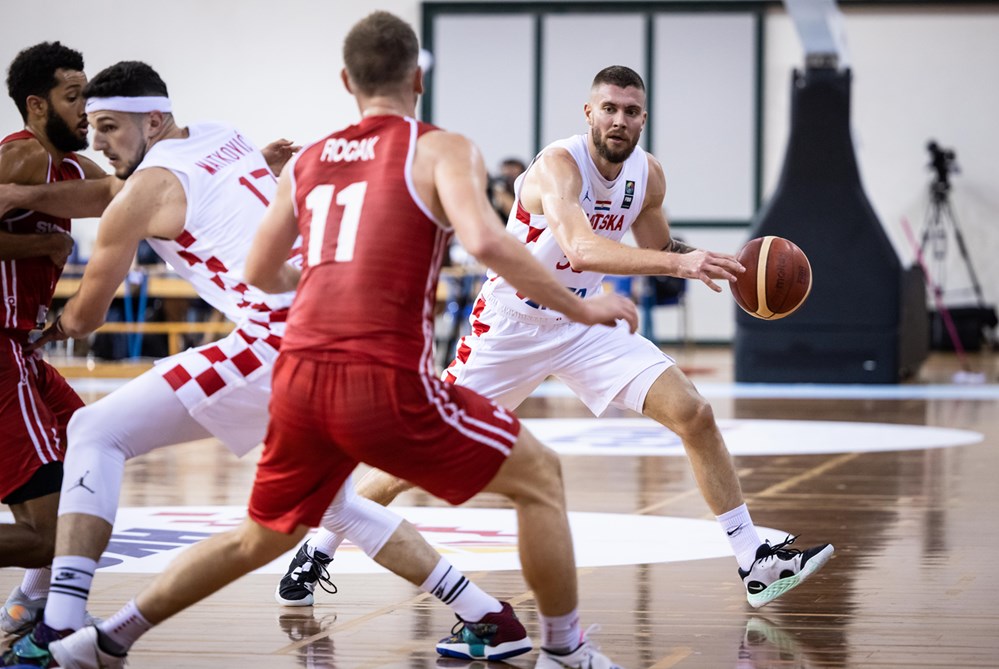
Karlo Matković finished the match with 17 points, 12 rebounds and 5 blocks, Dario Šarić scored 13 (7 rebounds), Ivica Zubac (7 rebounds) and Bojan Bogdanović 12 each, Toni Perković and Jaleen Smith 7 each, and Roko Prkačin 6 points.
The first game at EuroBasket in Milan will be played on Friday, September 2nd, 2022 at 17:00 against Greece.
Result by Quarters: 22-10, 28-16, 20-15, 14-12
Find the Boxscore here
Basketball World Cup 2025: Croatia Surprises at Smith Debut in Poland 69:72 (31:21)
August 25, 2022 - The savior of croatian basketball may have arrived. Recently imported and naturalized US American Jaleen Smith managed to help the Croatian National Basketball Team in his debut game today. The checkered team surprisingly won the first points in the first game of the 2025 World Cup pre-qualifier in Warsaw against Poland.
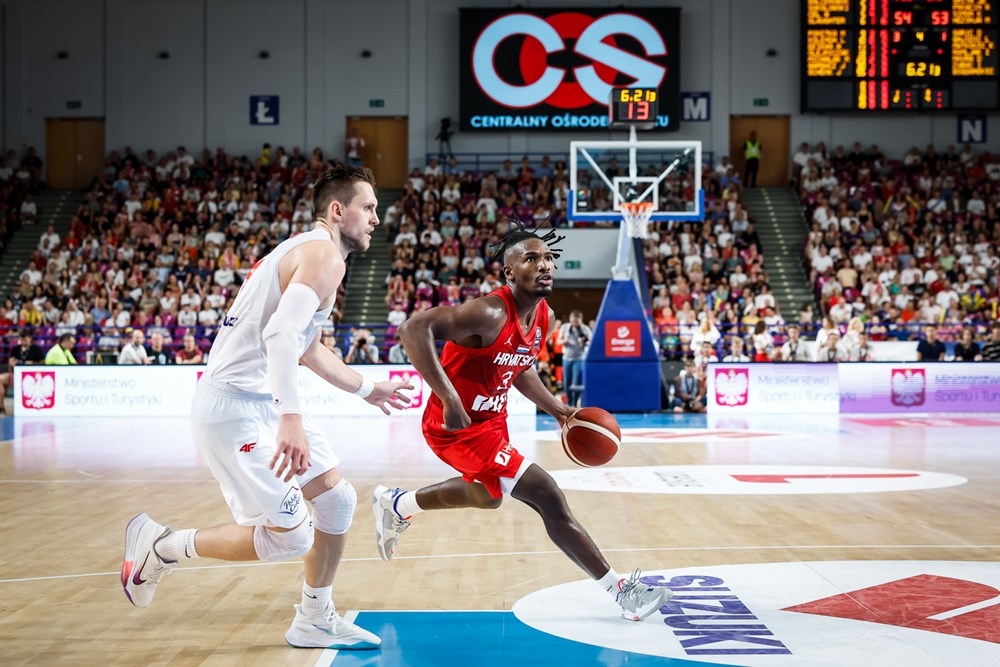
Needed a lot of time to get rid of the weight on his shoulders: Jaleen Smith
During the first half coach Damir Mulaomerović did not seem to have found the right strategy. Poland dominated on both ends of the court, and Croatia led only in the category of turnovers. The guest team had lost the ball a total of 9 times in the first 20 minutes and it was no surprise that Poland was up by ten points when the half-time buzzer rang.
 Helped the team with his routine: Krunoslav Simon
Helped the team with his routine: Krunoslav Simon
All eyes were on the new Croat Jaleen Smith and it seemed like the pressure was too much for the American. His stats looked terrible with only 1 field goal (a three-pointer) hitting its target in 8 attempts. Then again he collected 8 rebounds, which is an extremely high number for a guard. Smith was not the only one who had problems finding the basket. Together with Gnjidić, Simon, Šarić and Bogdanović the Croats around Smith had made only 5 of 28 three-point attempts in the first 38 minutes.
 Poland dominated the first half of the game
Poland dominated the first half of the game
The croatian team was carried by Zubac, Šarić, Bogdanović and the routine of Simon. Prkačin who had shown a great game against Finland did not play, just like Mavra and Perković.
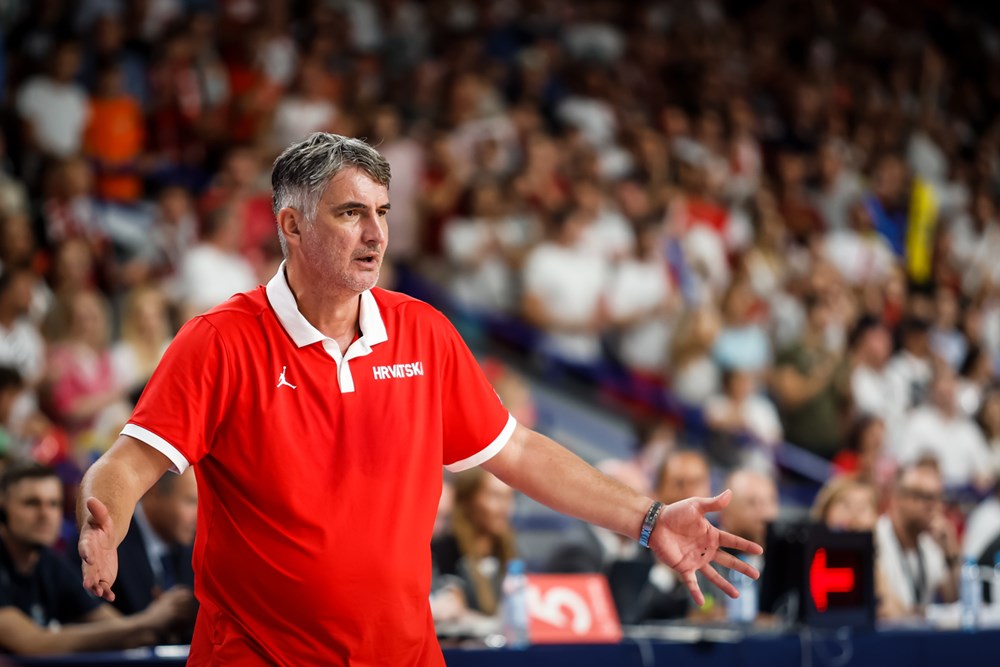
Coach Damir Mulaomerović
Luckily, after a good performance from the entire team that lead to a close final, Hezonja made his last 2 three-point attempts in crunch time before Smith added 2 successful free throws to give Croatia a 67:72 lead with 12 seconds remaining. Poland was able to get the last two points but could not turn the game around.
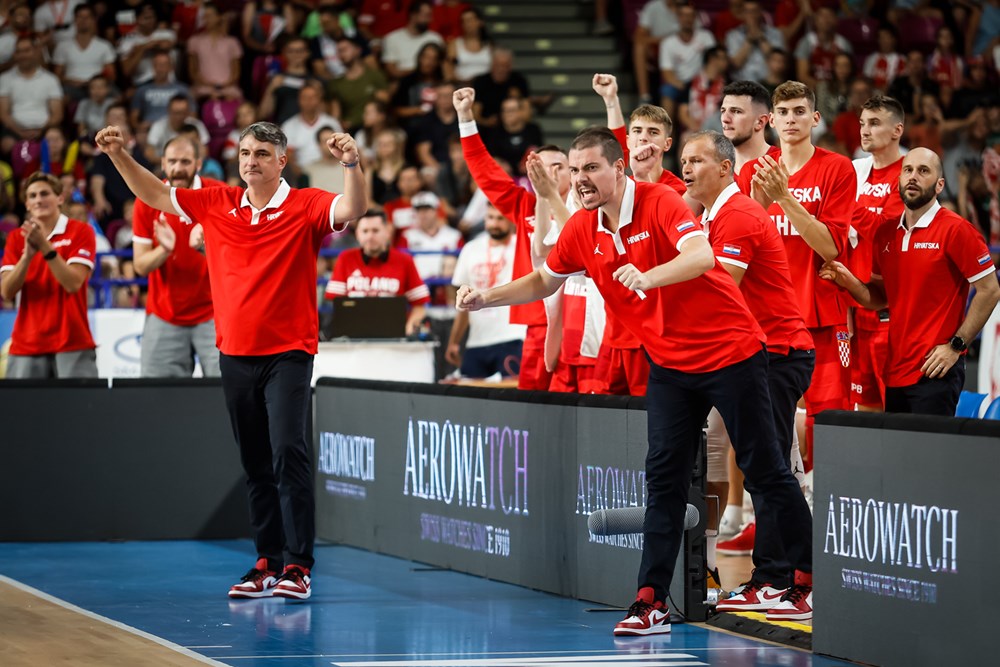
The much needed victory for Croatia is celebrated by the entire bench
Polish coach Igor Milicic's best man, who also was top-scorer of the day, was Mateusz Ponitka with 26 points, 6 rebounds and 6 assists. Mulaomerović on the other side had three players in double digits: Zubac who had a double- double with 19 points and 10 rebounds, Bogdanović with 16 points (8 rebounds) and Hezonja with 10 points.
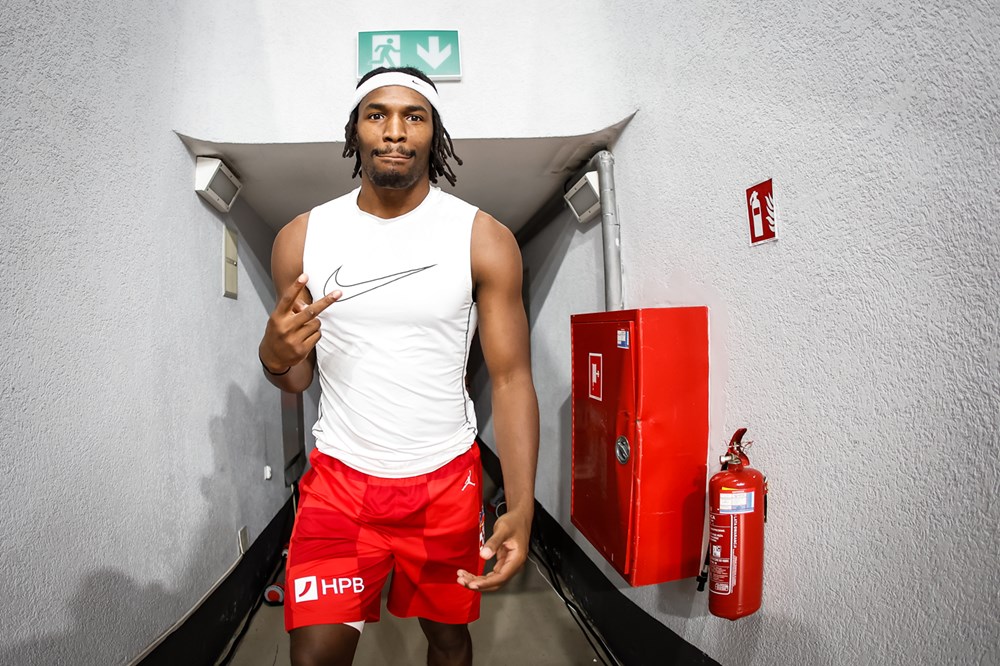
Last hope for Croatian Basketball: American "Firefighter" Jaleen Smith with confidence before the game
Result by quarters: Q1:15-11 Q2:16-10 Q3:16-28 Q4:22-23
Find the boxscore with detailed statistics here
Meet Dario Gjergja, the Croatian Coach Leading Belgian Basketball
April 9, 2022 - TCN met Dario Gjergja, the coach of the award-winning basketball team Filou Ostende and also of the Belgian national basketball team. This Croat on top of Belgian basketball reaps success and has already won the Coach of the Year title 4 times!
Dario Gjergia is a Croatian coach who has found a second home in Belgium. In recent years he has achieved excellent results: during 11 seasons as coach at Filou Ostende, he has already won 10 national basketball championships (with the 11th still ongoing), and since 2008, he is the coach of the Belgian national team, appointed until 2025 (which would make him the longest-serving Croatian coach of a foreign team, more than Petrovic, Repesa and Tabak).
Seriousness, commitment, perseverance, and his Dalmatian temperament are the characteristics that distinguish him and for which he is appreciated in Belgium. Hear what his players say about him:
“His basketball IQ is off the charts. Dario Gjergja knows everything; he lives for basketball. He’s a real student of the game. He knows every play, every offence, every defence. He’s giving confidence to everybody, and with him, everything is clear from the beginning”.
He built his talent step by step, without ever stepping over anyone and by seizing every opportunity life gave him. Gjergja, as it is clear from his surname, was born and raised in Zadar, the Croatian city of basketball, the town where orange balls echo in all the streets and alleys and where all the legends of Croatian basketball have played. Like all the boys who grew up there, Gjergja also played basketball when he was young. But when he came of age, he understood that his passion was to become a coach; he saw himself more in this role than as a player. Therefore, he decided to study at the Faculty of Kinesiology of the University of Zagreb and, at the same time, he self-financed courses to become a coach.
At the age of 25, he became the assistant coach for KK Zagreb. He later went to Cibona, in Russia with Ural Great Perm, then back to Croatia with the Under-20 national team. In 2008 he moved to Belgium as an assistant coach for Charleroi and then as the main coach in Liège. Finally, at the end of 2011, he started coaching the FILOU Ostende, where he truly feels at home.
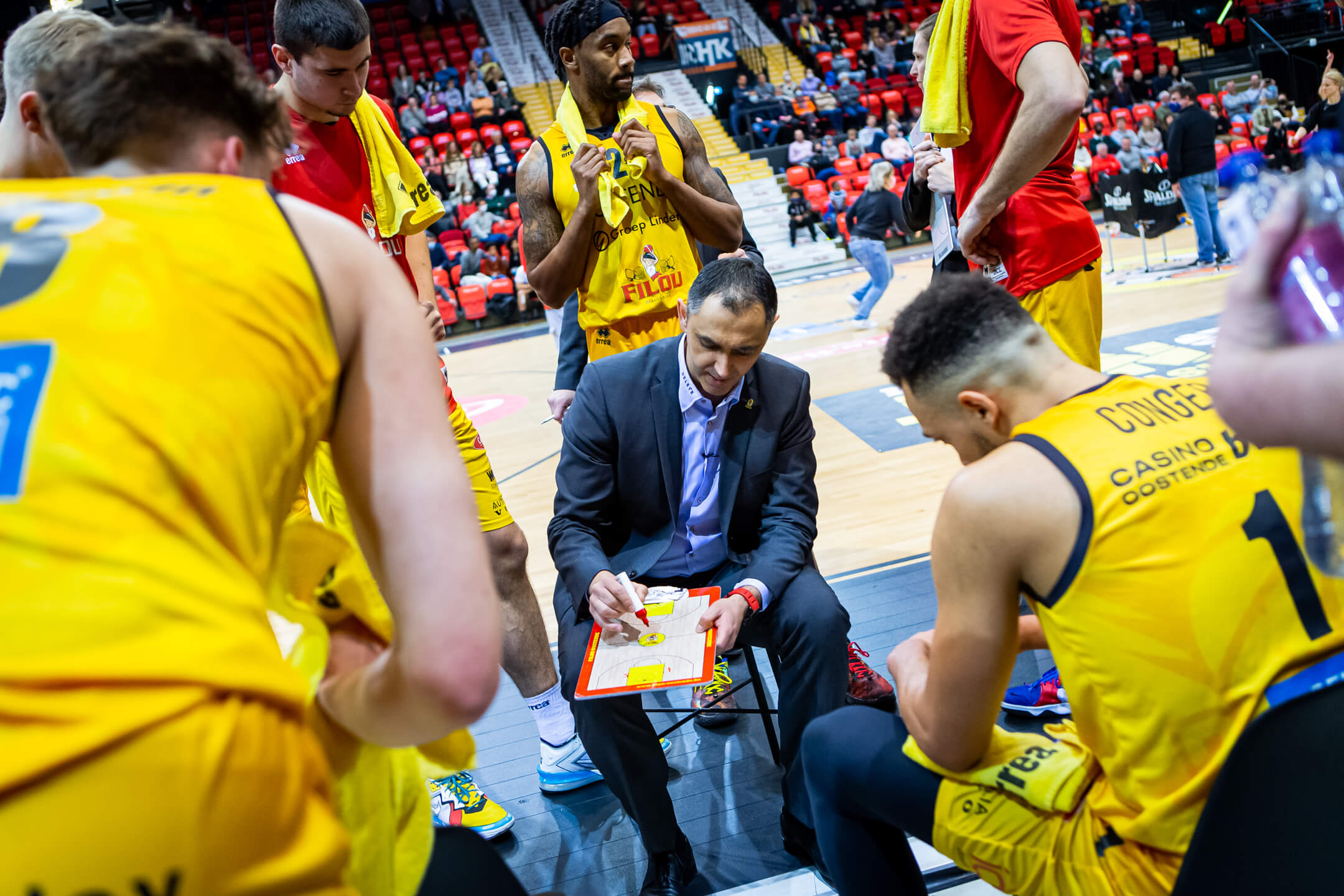
Official photo @basketbalcluboostende
You have been in Belgium for many years now. You lived both in Wallonia and Flanders. What are the main differences between the two regions?
I arrived in Belgium in 2008, where I started first as an assistant in Charleroi and then as a coach in Liège. At the end of 2011, I started coaching the Ostend team, and since then I have remained. I feel so well here that I have also become a Belgian citizen. In Flanders everything is very well organised, they are hard workers, very precise and reliable. I appreciate these characteristics since I feel they belong to me too. There are many differences between the Walloons and the Flemings. The first difference is the language: the Flemings speak Flemish (similar to Dutch), and the Walloons instead speak French. There are also differences in the origins: the Flemings are descendants of the Germans and are skilled traders, while the Walloons, who descend from the Celts, have a long tradition in the production of steel and textiles. I mean, there are so many differences between them! In these 14 years, I have learned to accept their differences and understand perfectly both languages. Still, the official language in the game remains English, even to accommodate all the players’ nationalities.
Regarding this point, how many nationalities are there in the Ostend team?
We have many different nationalities: in addition to Belgian players, we have four from the States, one from Ghana, one from Finland, and one from the Netherlands. Our captain is of Serbian origin. His name is Dusan Dordevic, and I have had an excellent relationship with him from the beginning. Haris Bratanovic is of Bosnian origin but was born and raised here, so he has little of the Balkan effrontery and more of the Belgian correctness. There’s a great variety and it’s a great team of professionals. In the coming seasons, more and more players might come from our region because the budgets of the Belgian teams have been reduced considerably, and since our players cost a little less, I think they could take advantage of it in the future.
And what’s it like to coach the Belgian national team as a foreigner?
Honestly, the very same players are foreigners among themselves too. The Flemings and the Walloons are very parochial, but I insist and constantly work on the fact that there should be no room for differences when playing for the national team. It is unthinkable not to sing the national anthem when the national team plays, so I expect them to stand up, sing it, and play with a common goal. I also feel like a father, not just a coach. They respect me very much, and it is gratifying to see that my work is recognised, especially in the youth categories. I feel honoured that, as a foreigner, I was given a chance to become the coach of the national team. When they hired me, they knew that I am a patriot and also that I don’t have an easy temperament. Perhaps, I was chosen also to better manage relationships and behaviours within the team. I have always had examples of very stern figures in my life ever since I was a boy: my father was in the army, and my coaches were not at all soft, above all Danijel Jusup and prof. Slavko Trninic. All these strong personalities taught me to be diligent, serious, and respectful at work. Unfortunately for the players, I also expect it from them!
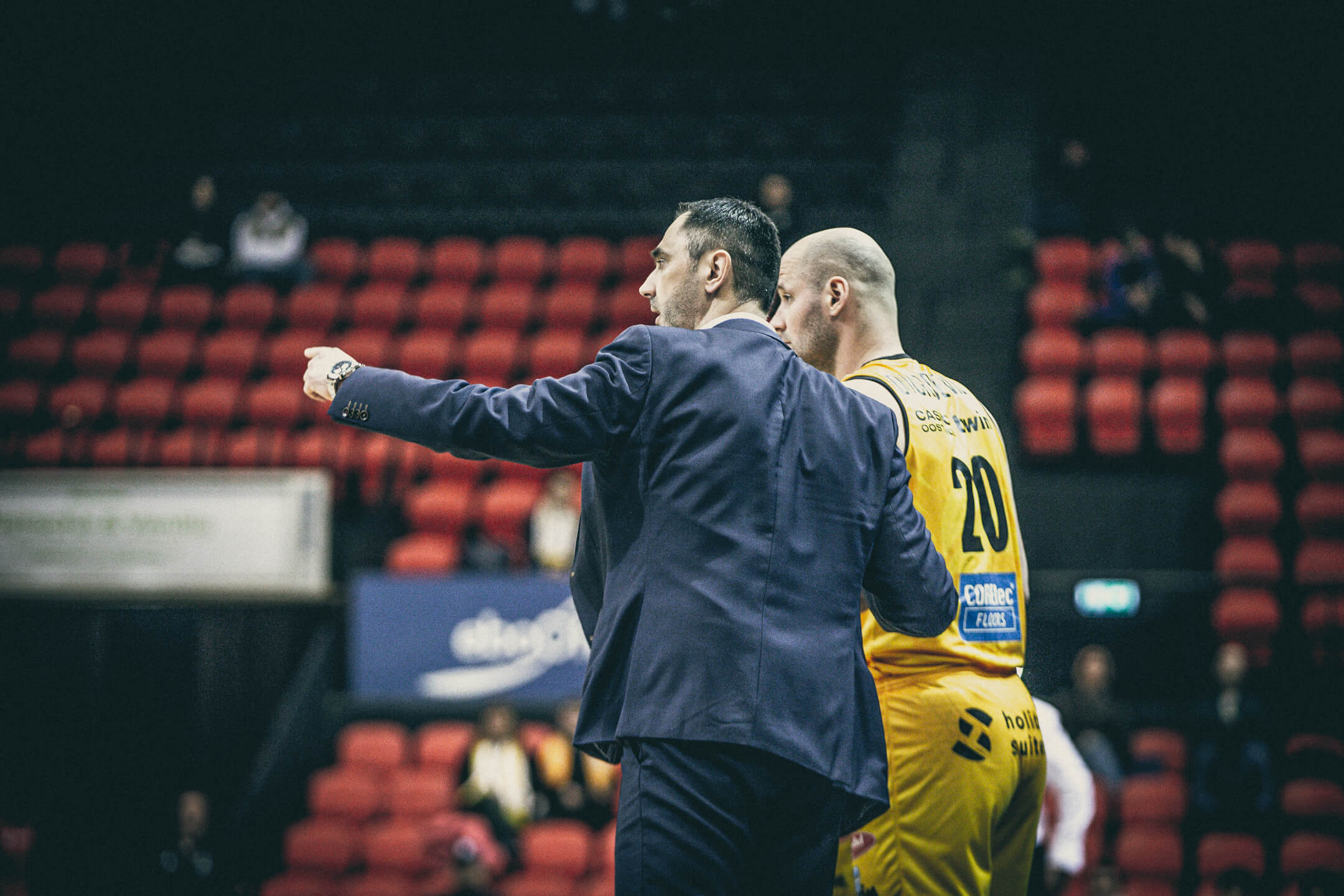
Official photo @basketbalcluboostende
Ostend is a quiet town on the Belgian coast on the North Sea, a holiday destination for wealthy Belgians who often own a second home there. A small town as big as Zadar and similar in some ways, but where the north wind beats the “bura” blowing in Croatia. Can you confirm that?
Yes, the wind here is actually powerful and constantly present! Ostend is similar to Zadar because it is on the seaside, and everything is within reach. I live 150 meters from the arena; I walk everywhere. I love this peace and not being in a busy city: this is my favourite lifestyle. You do not waste time in traffic, and you can find time to be with your family, free your mind from worries, and do sports every day. Here I can put into practice the motto: mens sana in corpore sano. My wife and my daughter have also settled here very well. When I feel the need for some Croatian flavour, I get pampered in the Restaurant Dalmacija, owned by a lady from the island of Brac. Thanks to her, I try to set aside my homesickness.
And when are you planning to go back "home"?
I try to go back whenever I can. I still have my family there, childhood friends, and "colleagues" coaches that I often hear and with whom we also discuss professionally. Zadar is always in my heart, and I don’t see the end of my career abroad. I never look too far; I’m used to living day by day and facing the challenges and opportunities that life offers me. I’d like to go back home at the end of my career, but there’s still time!
The 46-year-old Croat extended his contract with the Belgian National Team until 2025. Gjergja’s big goal will be to qualify Belgium for the 2023 World Cup, which will take place in Indonesia, Japan, and the Philippines.
To read more about sports in Croatia, follow TCN’s dedicated page.
2023 Basketball World Cup Qualifiers: Finland Tops Croatia 77:71 in Espoo
November 28, 2021 - Finland tops Croatia 77-71 in the 2nd round of Group C in Espoo, giving Croatia its second defeat in the 2023 Basketball World Cup qualifiers.
After losing to Slovenia 74-76 in a dramatic finish at the opening of the World Cup qualifiers in Zagreb, Croatia was unable to defeat Finland in Espoo.
Three-pointers played in Finland's favor on Sunday, with 14 scored by the hosts and only four for Croatia.
Croatia struggled in the first quarter, scoring just seven points in the first seven minutes. Fortunately, Finland wasn't much better, scoring only 5 points more. Coach Veljko Mršić changed 11 players in the first eight minutes!
At the end of the first quarter, Croatia turned the result in their favor with an 8-0 series (15-12), and at the end of the first quarter, they were up +1.
The second quarter was even, and the teams went into halftime at 34-34.
The third quarter saw Finland score a 6-0 series for 40-34, then went up +7 (50-43). 3:50 minutes before the end of the third quarter Finland was up by 10 points (53-43 ). By the end of the quarter, Croatia still managed to reduce the score to 59-55.
Six minutes before the end of the game, Croatia was just one basket behind (64-63), which they kept with five minutes to go (67-66).
With three minutes to go, Croatia still managed to keep the score tight (68-69), and with two minutes left, Croatia led 70-69. That was their first lead in the second half.
Edon Maxhuni returned the home team to a 72-70 advantage with a three-pointer, and Filip Bundović realized one free throw for 72-71 with just over a minute left.
Sasu Salin brought Finland to +4 (75-71) with a new three-pointer 40 seconds before the end. Croatia shot two three-pointers in the next attack, but Rogić and Marčinković did not score. Salin then scored two free throws for 77-71, which was the final score.
Finland was led to victory by Maxhuni with 15 points and five assists, Shawn Huff scored 14 points and nine rebounds, and Elias Valtonen scored 12 points and eight rebounds.
All 12 Croatia players were among the scorers. Bundović scored 16 points, and Perković and Danko Branković scored 10 points each.
Slovenia and Sweden, which both achieved victories in the first round, will meet tonight in Koper.
Qualifications continue in February when Croatia will play two games against Sweden. The first is scheduled for February 25, and the return in Sweden is three days later.
Europe will send 12 national teams to Asia for the World Cup, which will be held in Japan, the Philippines, and Indonesia in 2023.
There are eight groups of four teams in the first round of European qualifiers, and the three best from each group will advance to the second round. It is important to note that all points from the first part of the competition are transferred.
In the second round, four new groups of six national teams will be formed, and the three best teams from each group will qualify for the World Cup.
Source: HRT
To read more about sport in Croatia, follow TCN’s dedicated page.
2023 Basketball World Cup Qualifiers: Croatia Loses to Slovenia in Dramatic Finish (74:76)
November 25, 2021 - The Croatia basketball team opened the 2023 Basketball World Cup qualifiers with a loss to Slovenia in Zagreb on Thursday night.
The Croatia basketball team opened the first round of 2023 World Cup qualifications against Slovenia at the Dražen Petrović hall in Zagreb on Thursday. The 2023 Basketball World Cup will be held in Japan, the Philippines, and Indonesia, from Friday, August 25, 2023, to Sunday, September 10, 2023.
Lineups
Croatia: Rogić, Marčinković, Drežnjak, Marić, Rudan. Klupa: Gnjidić, Kalajžić, Badžim, Prkačin, Gabrić, Bundović, Branković, Perković.
Slovenia: Rupnik, Blažić, Prepelič, Dimec, Murić. Klupa: Nikolić, Rebec, Lapornik, Hodžić, Čebešek, Kosi, Macura, Habot.
1st Quarter
With a 3-pointer by Bundović, Croatia led 19:16 at the end of the first 10 minutes. It was 11:3 and 16:10 for Croatia, though Slovenia equalized at 16:16.
2nd Quarter
Slovenia went into halftime leading 39:41. Rogić's 3-pointer was too early and too short for a possible lead at halftime. Croatia also had a 10-point advantage, but it was Slovenia to go into the 3rd quarter ahead.
3rd Quarter
Croatia led 56:55 going into the last 10 minutes of the game. Bundović was the first player to hit double-digits for Croatia against Slovenia.
4th Quarter
The dramatic final quarter saw Croatia maintain the lead, with two minutes to go ahead 72:69. However, Slovenia ultimately came back in the last two minutes to win it 74:76.
About two thousand spectators came to see the much younger and promising Croatia play in Zagreb tonight. Bundović ended the game with 16 points, seven rebounds, and five assists.
The World Cup qualifiers are played in six qualifying cycles of two matches, divided into rounds 1 and 2, as was the case with the qualifiers for the last World Cup. The next cycles are in February 2022, June 2022, August 2022, November 2022, and February 2023.
Croatia plays Finland next in Espoo, part of the more famous Helsinki metropolitan area, on Sunday, November 28 at 18:00.
To read more about sport in Croatia, follow TCN’s dedicated page.


